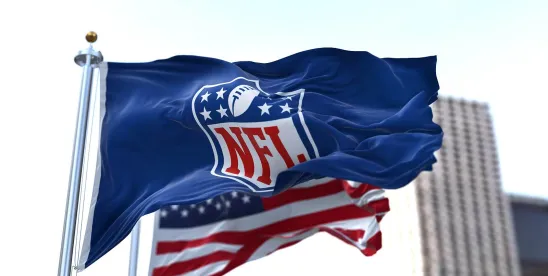On April 22, 2025, the National Football League (NFL) filed an amicus brief asking the United States Supreme Court to take on a Video Privacy Protection Act (VPPA) class action case against the National Basketball Association (NBA). In my last post, we covered a recent VPPA lawsuit against a movie theater company and reviewed the provisions of the Act. In recent years, we analyzed how plaintiffs have applied the VPPA outside of traditional video contexts. This week, we dive deeper into a VPPA case against the NBA and explore the NFL’s amicus brief supporting the NBA’s position, asserting why the Act should not apply in the modern video streaming context, particularly for sports leagues.
Case Background
In the case against the NBA, the plaintiff alleged that they subscribed to the NBA’s newsletter and watched free videos on its website while logged into their Facebook account. In doing so, the NBA reportedly shared their personal viewing information with Facebook via the Meta Pixel tracking technology. The plaintiff asserted that they were a “subscriber of goods and services” and therefore met the definition of a consumer under the VPPA. See Salazar v. Nat’l Basketball Ass’n, 118 F.4th 533 (2d Cir. 2024).
To recap, the VPPA prohibits a video tape service provider from knowingly disclosing a consumer’s personally identifiable information—including information identifying a person as having requested or obtained specific video materials or services from a video tape service provider—to a third party without the consumer’s express consent. A “video tape service provider’ is defined as someone “engaged in the business … of rental, sale, or delivery of prerecorded video cassette tapes or similar audiovisual materials,” and has been interpreted to apply to video streaming service providers. A “consumer” refers to a renter, purchaser, or subscriber of goods or services from a video tape service provider.
In October 2024, the Second Circuit held that the plaintiff was the NBA’s consumer under the VPPA, interpreting that the term “consumer” should include an individual who rents, purchases, or subscribes to any of a provider’s goods or services, not just those that are audiovisual. The Second Circuit also concluded that even though the NBA may have obtained only the plaintiff’s name, email, IP address, and cookies associated with their device, the provision of such information in exchange for receiving services constitutes a “subscription.” Further, the Second Circuit also held that the VPPA applies even for videos accessed on a public page that does not require a sign-in for exclusive content.
The NBA filed a petition for certiorari, requesting the Supreme Court to review the Second Circuit’s decision.
The NFL’s Amicus Brief
The NFL’s amicus brief highlights that the Second Circuit is not alone in this broad interpretation of the VPPA. The Seventh Circuit has also held that a plaintiff need not have rented, purchased, or subscribed to the defendant’s audiovisual goods or services to qualify as a consumer under the VPPA, but that any goods or services are sufficient. However, the Sixth Circuit has held to the contrary, reasoning that the definition of “consumer” in the statute does not encompass consumers of all goods or services imaginable, but only those offered in a video tape service provider context. The NFL supports the latter position.
The NFL warns that the “explosion of VPPA class actions” is a concern for content providers like the NBA and NFL, who risk “massive liability” that was “unforeseen by Congress” when the VPPA was enacted in 1988. According to the NFL, tracking technology is “ubiquitous” and “makes much of the content on the Web free.” The NFL warns that if online content providers face such liability, “many content providers would be forced to pursue alternative sources of revenue as a result of the reduction in targeted advertising revenues,” which may result in consumers paying for currently free applications and services.
For sports leagues specifically, the NFL asserts that these organizations often have “hundreds of millions of fans,” many of whom purchase or rent non-audiovisual goods and services that would qualify them as a consumer under a broad interpretation of the VPPA. For example, a fan who bought tickets to a sports game or purchased league apparel through the NBA or NFL website, who then happened to watch a free video on the league’s website while logged into Facebook, may be considered a consumer, and could seek VPPA damages.
The NFL also asserts that there is no real harm to VPPA plaintiffs because using pixels is not a secret and that “consumers are well aware that enabling the use of cookies permits personalized advertising.” The NFL emphasizes that the plaintiff in the NBA case admitted they could have seen that the NBA was using the Meta Pixel by viewing the code on the NBA’s website. In addition, Meta’s Cookie Policy informs users that it may obtain information from third parties. Therefore, the NFL also questions consumers’ standing for such VPPA suits based on no real harm.
Last year, plaintiffs initiated over 250 VPPA lawsuits. Yet, the circuit split still leaves open the question: Who qualifies as a consumer under the VPPA in this modern video streaming context? The NBA, with support from the NFL, has punted the question to the Supreme Court. If the writ of certiorari is granted, we might find the ball in SCOTUS’ court.



 />i
/>i

